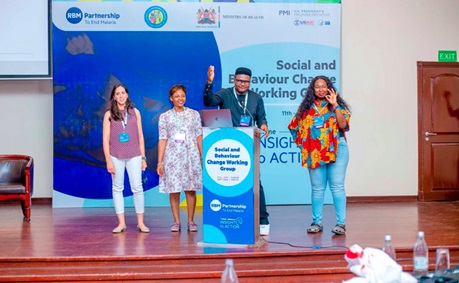
Empower, partner youth to end malaria
World leaders have been urged to leverage the power of the youth as change agents and partner with them to push forward health and social agenda, especially in the fight to end malaria.
Making a case for the youth at the annual meeting of the Social and Behaviour Change Working Group (SBC WG) of the Roll Back Malaria (RBM) Partnership to End Malaria in Nairobi, Kenya, a Co-chair of the RBM Youth Workstream, Odinaka Kingsley Obeta, said young people were at the helm of global and continental campaigns to end malaria, and as such there was the need to continue to empower and invest in them for leadership roles in the future.
Consequently, he said the RBM Partnership to End Malaria Youth Workstream was launched in August, this year, to empower young leaders to drive change which also aligned with the Africa Union’s agenda to end malaria by 2030.
Workstream
Mr Obeta said the youth workstream was established to coordinate and elevate youth engagement in the fight against malaria.
Additionally, it also aims to provide a platform for youth initiatives to establish and leverage long-term partnerships within the malaria community,
‘‘The RBM Partnership youth workstream is for everyone working on or with young health leaders with a close lens to end malaria”, he added.
Mr Obeta said in 2021, the RBM Partnership to End Malaria, in collaboration with Gallup International carried out a survey to explore attitudes to malaria among young people aged 18-34 in six countries, namely Kenya, Mozambique, Nigeria, Rwanda, Senegal and South Africa.
The survey showed that nine out of 10 young people were ready to draw the line against malaria while “61 per cent of us believe we’re the generation that will end malaria.”
Therefore, he said the youth workstream would leverage the power of partnership to work with young people in malaria-endemic communities to adopt the use of communication tools for social and behavioural change in the context of each country with the support of Ministries of Health and the national malaria control programmes to end malaria.
To achieve that, Mr Obeta noted that there was a need to support the action plans of youth NGOs in the fight against malaria, support studies to determine malaria problems in the community as well as conduct studies on attitudinal and practical behaviour in favour of the fight against malaria.
Mandate
To ensure the workstream is driven by a true youth perspective and leadership, Mr Obeta said all youth workstream members were under 35 years old.
The workstream includes four leads - two Anglophone and two Francophone, a convener based at the RBM Secretariat and a steering committee formed by members who represent a variety of organisations, sectors, skill sets and geographies.
He said, among others, the youth workstream would coordinate the global youth response to malaria to ensure consistent messaging and approaches across youth groups and partners; and amplify the amazing work being done to fight malaria by young people around the world at all levels.
Mr Obeta announced that the launch of the Ghana Malaria Youth Corps would be held in Accra in October this year.
